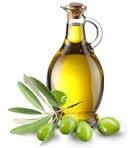 I’m always reading up on the latest nutritional information and research that can impact your heart for better or worse. I like to pass along this information to my patients, as well as my readers, in an effort to keep your hearts as healthy as possible. Recently, some surprising information on the authenticity of the olive oil that you may be buying came across my desk. As I recommend olive oil to keep the heart healthy, the information in this report was disturbing. Let me tell you about it…
I’m always reading up on the latest nutritional information and research that can impact your heart for better or worse. I like to pass along this information to my patients, as well as my readers, in an effort to keep your hearts as healthy as possible. Recently, some surprising information on the authenticity of the olive oil that you may be buying came across my desk. As I recommend olive oil to keep the heart healthy, the information in this report was disturbing. Let me tell you about it…
Heart Healthy Olive Oil or Food Fraud?
I always recommend my patients to add at least 2 tablespoons of EVOO (extra virgin olive oil) to their diets daily to keep their heart healthy. Even though many vegetable oils are better for your heart health than animal fats, olive oil is particularly healthy. It is a monounsaturated fat that works to break down plaque buildup in blood vessels. It also helps keep the vessels open and pumping blood freely.
And, although all grades of olive oil are good for your heart, your heart is particularly fond of EVOO. It has been proven in research to really boost heart health and keep it working well. Necessarily, in order for my patients to reap the benefits of this research, the olive oil they use has to be an authentic, good quality extra virgin olive oil.
Olive oil is a large part of the Mediterranean diet. Recently, cardiac researchers reported in the New England Journal of Medicine that olive oil is one of the reasons why people who eat a Mediterranean diet have such low incidences of heart disease. In those regions of the Mediterranean where they use a lot of olive oil in their diets, people don’t worry about the authenticity of the olive oil they eat because they harvest the olives and extract the oil themselves.
That’s why this next piece of news is concerning…
Recently, Fox News reported that you may not be getting what you pay for when you buy olive oil. In fact, the olive oil you’re buying may only partially be olive oil diluted with cheaper vegetable oils – not even olive oil! Unfortunately, that’s a concerning truth about olive oil that’s becoming more widespread, according to a report out of UC (University of California) Davis’ Olive Center.
In their study, the Center found that about 69% of all extra virgin olive oils were flawed and really did not meet the criteria that EVOO should have. According to these researchers, olive oil has been one food product that has been in the spotlight for a while now as evidence of “food fraud.” A higher price tag, they reported, doesn’t always indicate superior quality. That $20 bottle of “designer” olive oil may not be any better – and may be much worse in quality – than the $7-8 bottle of your grocer’s store brand of EVOO.
How can you, as a heart-health conscious consumer know the difference? The researchers at UC Davis offered these tips:
1. Choose a good store. If you can find a store that sells olive oil that will allow you to taste it before buying it, this is a good way to ensure you’re getting what you pay for.
2. Taste. If you can taste the oil, look for one that has a fruity taste. After all, olives are fruit and olive oil made from them should have a fruity taste. The stronger the fruit taste, the more likely it is to be 100% olive oil. You know what fresh green olives taste like, right? Rather sharp, a little tart/sour, even peppery, with just a hint of sweetness to them. If it’s very bland tasting oil, it’s likely diluted with some other cheaper, vegetable oil, like plentiful, cheaper soybean oil.
3. Bottle color. When choosing an EVOO, be sure it is contained in a dark (dark green, black) glass bottle rather than a clear bottle. Dark glass ensures that light exposure has not robbed the essential heart-healthy polyphenols in EVOO.
4. Date of manufacture. Like all foods, your oil should contain a freshness, or “best by” date. Choose oil bottled in the current, or just prior, year. Olive oil is really a “fruit juice” that is best consumed shortly after the extraction. The longer it sits, the less potent its heart-healthy polyphenols. Don’t choose oil that is older than 2 years prior to the date you’re buying it.
5. Place of package. Many olive oils claim to be “bottled in Italy, Spain, Greece”, that can be misleading to the consumer. It doesn’t mean that the olives came from that region. Look for labels that state “Protected Designation of Origin” (PDO), or Protected Geographical Indication IGP (Italian).
I want you to get the best possible olive oil to boost your heart health efforts. Just as a very expensive olive oil doesn’t mean that you’re really getting that best grade of oil, spending too little is not good either. A good grade of extra virgin olive oil will usually cost about $8 for a half liter – give or take $1. Though it may take a little more effort on your part in buying a good grade olive oil, your heart (and your brain!) will reward you with better health.
Stay Well,
Ron Blankstein, M.D.
Olive Oil – Food Fraud? http://www.foxnews.com/leisure/2013/08/21/what-should-know-before-buying-olive-oil/
http://www.cnn.com/2013/02/26/health/five-things-olive-oil
